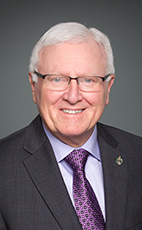Mr. Speaker, it is a pleasure to speak tonight to Bill C-399. I feel very comfortable with the debate and the discussion because I have a close relationship with a first nations band in my riding, the Millbrook Band, whose chief is Lawrence Paul.
First, I want to compliment the hon. member for raising the issue of the auditor and the ombudsman proposal. Many first nations bands have problems with negotiations and controlling money. I believe we do have an obligation to ensure that all first nations people are treated fairly, have access to justice and have a fair approach to dealing with the finances of the first nations. Not all do, so the hon. member's proposal may have some merit.
I also want to mention the new Bill C-61. I congratulate the minister for taking a courageous step. This is a very difficult issue to deal with. For years and years not a lot has been done but I believe the bill on the table now deserves a lot of consideration. I applaud the minister for his courage in bringing it forth because it is not an easy subject and not an easy issue to deal with.
I have often felt that not enough has been done. We often deal with first nations issues as they happen. We deal with the symptoms not the root causes of the problems. I believe the new bill starts to do that. I know it will come under a lot of criticism, scrutiny and opposition, but fundamentally it is a good direction and a good start. It will be very interesting to see how it unfolds, how first nations people deal with it and how they respond.
I want to talk for a minute about the Millbrook Band. One of the previous speakers mentioned the Westbank Band and how it could be used as an example for other first nations. I believe the Millbrook Band outside of Truro, Nova Scotia could also be used as a model. Chief Lawrence Paul has done a great deal in economic development to bring a higher standard of living to his people. He has worked very hard to attract businesses and use every asset that he has at his control.
Chief Lawrence Paul and I do not always agree, in fact, quite often we disagree, but I admire him for his spirit, his initiatives and his determination to help his people. He has recently developed what he calls a huge power centre along the Trans-Canada Highway at a very high traffic area in Nova Scotia, and perhaps the highest traffic area. He has attracted a Tim Horton's, an A&W, theatres and an Ainee's Convenience Store to the centre and has plans for many more developments to create jobs and employment for his people. He has also installed an entertainment centre at this location which is a form of entertainment where his band takes in a lot of revenue.
He has also developed a Millbrook fishery. He has two approaches to the fishery. One is that he is involved in the fishery on the Bay of Fundy and the Atlantic Ocean. He is also involved in the fishery through an agricultural project which is just beginning. This is very innovative, dynamic and very imaginative for a first nations band.
I believe the Millbrook Band has managed its funds well. It has been able to return money to all its residents in the form of scholarships and housing assistance, and in many other areas. Therefore I think the Millbrook Band could be used as a model. It is certainly not perfect but it has done a lot of things right and has done a lot to help its people.
The challenge in the future will be to bring all of the first nations together to agree on this new governance model. It will be difficult because there are over 600 first nations and many are governed under different models and in different ways. The circumstances are completely different from first nation to first nation. Some are very small, some are quite large, some are prosperous and some live in poverty. It will be difficult to find one formula that fits all. Each first nations band will need the flexibility to develop in its own direction. Each band must be transparent and accountable to its people.
The bill we are debating today goes in the direction of ensuring there is accountability and transparency for all first nations people, not just the leaders. This is a critical part of the future for first nations.
Whether it is through Bill C-399 or through the new Bill C-61, we in this party hope the circumstances for first nations people improve. We hope they gain more ability to govern themselves, more control over their own destinies and able to use their resources and their ingenuity, like they have in Millbrook, to improve the quality of life for all natives.

